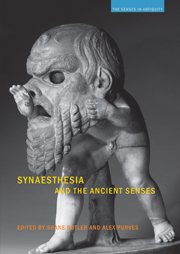Book contents
- Frontmatter
- Contents
- Contributors
- Introduction: synaesthesia and the ancient senses
- 1 Why are there nine Muses?
- 2 Haptic Herodotus
- 3 The understanding ear: synaesthesia, paraesthesia and talking animals
- 4 Aristophanes, Cratinus and the smell of comedy
- 5 “Looking mustard”: Greek popular epistemology and the meaning of δριμύς
- 6 Plato, beauty and “philosophical synaesthesia”
- 7 Manilius' cosmos of the senses
- 8 Reading death and the senses in Lucan and Lucretius
- 9 Colour as synaesthetic experience in antiquity
- 10 Blinded by th light: oratorical clarity and poetic obscurity in Quintilian
- 11 The sense of a poem: Ovids Banquet of Sence (1595)
- 12 Saussure's anaphonie: sounds asunder
- 13 Beyond Narcissus
- Bibliography
- Index
11 - The sense of a poem: Ovids Banquet of Sence (1595)
- Frontmatter
- Contents
- Contributors
- Introduction: synaesthesia and the ancient senses
- 1 Why are there nine Muses?
- 2 Haptic Herodotus
- 3 The understanding ear: synaesthesia, paraesthesia and talking animals
- 4 Aristophanes, Cratinus and the smell of comedy
- 5 “Looking mustard”: Greek popular epistemology and the meaning of δριμύς
- 6 Plato, beauty and “philosophical synaesthesia”
- 7 Manilius' cosmos of the senses
- 8 Reading death and the senses in Lucan and Lucretius
- 9 Colour as synaesthetic experience in antiquity
- 10 Blinded by th light: oratorical clarity and poetic obscurity in Quintilian
- 11 The sense of a poem: Ovids Banquet of Sence (1595)
- 12 Saussure's anaphonie: sounds asunder
- 13 Beyond Narcissus
- Bibliography
- Index
Summary
They will get it straight one day at the Sorbonne
We shall return at twilight from the lecture
Pleased that the irrational is rational,
Until flicked by feeling
(W. Stevens 1990: “Notes toward a Supreme Fiction”, III.x. 16–19)Philosophy has always been ambivalent about the senses. Its doubts begin with Plato, who makes fun of people who take pleasure in the sound of music, or in the colours and shapes of spectacles, while failing to grasp the nature of beauty itself (Plato Republic474d–477b). Plato's distinction between these philodoxoi, who relish appearances and love opinion, and philosophers, who go beyond perception in order to know the essence of things, lays some of the groundwork for the separation of rational minds and sensitive bodies in the pages of Descartes. The Cartesian argument that that we know that we exist because we think – and not because we see, hear, smell, taste and touch – is one of philosophy's most audacious efforts to establish that its methods for finding out the truth are intrinsically superior to the organs of perception that mediate experience and make life meaningful, whether one is a philosopher or not (Descartes 2008: 28). According to the tradition that starts with Plato and reaches a point of lasting influence in Descartes, sense perception is an obstacle that the intellect must remove in its quixotic pursuit of innocent knowledge.
- Type
- Chapter
- Information
- Synaesthesia and the Ancient Senses , pp. 155 - 166Publisher: Acumen PublishingPrint publication year: 2013



